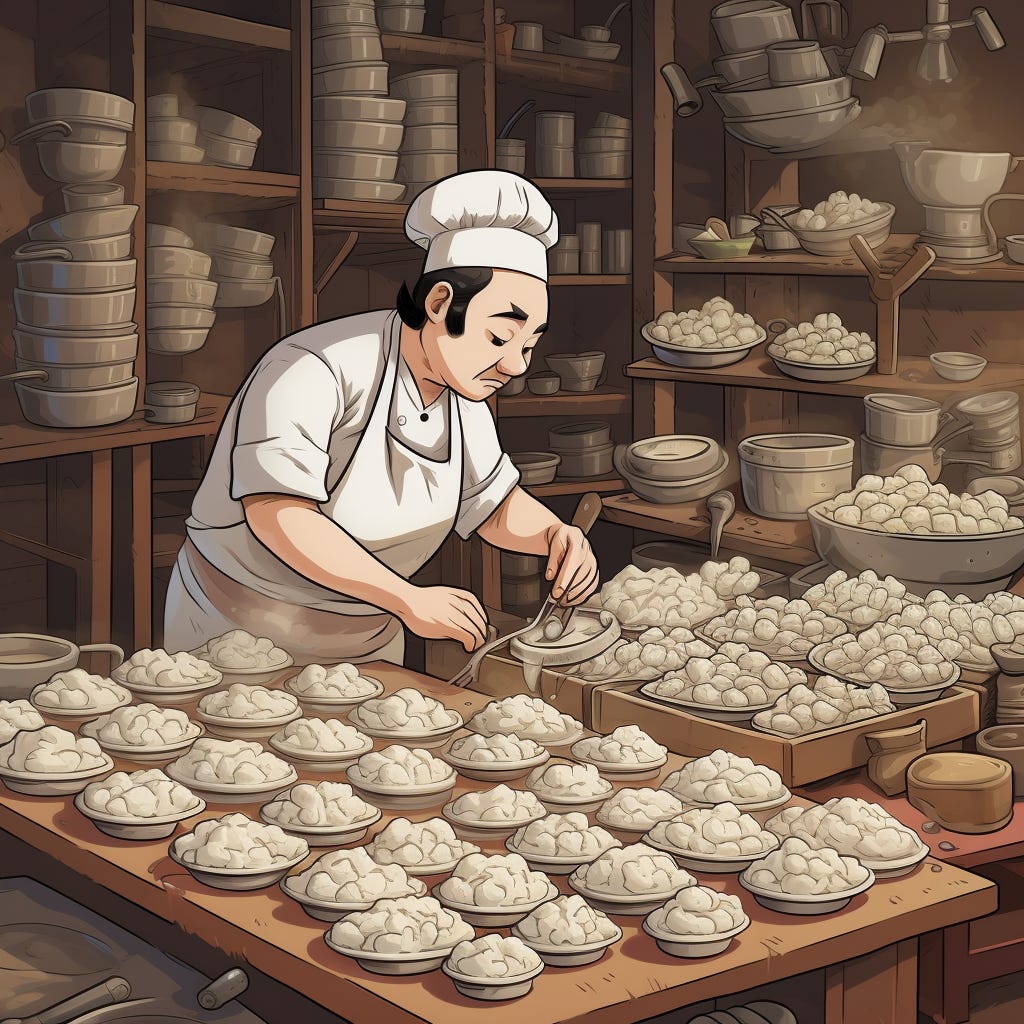Cookbook Survivor: Second Times and The Ten Worst Instructions
Sunday's Child Is Bonny and Blithe
Taking a break from cooking this weekend and eating out, but I thought I’d share two thoughts about the use and abuse of cookbooks.
First, that the real test of a recipe is not the first time you cook it, but the second time, if you liked it the first time. That’s when you find out if the recipe is genuinely a good one—that’s if it turned out just as well as the last time and you feel as if you could learn it enough to do it with greater ease and less checking of the recipe every single subsequent time. It’s almost like science: you are finding out if the recipe is replicable. This week I found out that the Crispy Smashed Chicken Breasts with Gin and Sage from the NYT Cooking app is indeed replicable.
It’s also when you find out if there’s something in the recipe that is always going to make you hesitate because there’s a step or a process that is always going to be a nuisance. It’s just like household chores, different people have different things in cooking that are like “oh man I hate X”, but here’s the things that make me think “do I really want to make this dish?”: they take a lot of attention or they take a lot of time or they take a lot of planning. There are certain dishes where the effort is part of the fun and adds to the ritual of service, like making a whole smoked brisket over 15 hours and so on, so I don’t include those on this list. If I am in the mood to do something like that, I know it from the start. These are instructions I might miss in picking a recipe and then only notice once I’m underway.
Caramelize these onions. Reason: it takes way longer than 90% of the cookbooks out there say. I feel sorry for home cooks who haven’t realized this and think they’re the ones screwing up.
Marinate for at least 12 hours; pickle this for hours or days; cure this for a week. This is sometimes just because I didn’t pay attention in planning out something that absolutely obviously has to have a long preparation like this. But there’s a fair number of recipes where I get into and then suddenly see that the meat is supposed to be marinated for six hours or more. At least sometimes that turns out to be unnecessary, where the really long marination adds very little; sometimes it’s important. Either way, if I didn’t notice that earlier, then either I’m cooking something else or I’m going to find out the hard way if the long marination is necessary.
Bone a fish, pick some crab, bone a chicken, or breakdown a bigger cut of meat. Painstaking preparation of a protein for cooking can be a tremendous hassle. I’m pretty good with boning a cooked fish at service, but there are certain fish that you’ve just got to get the pin bones out of beforehand. Picking crab meat out (or going through canned crab meat looking for shell fragments) is a serious nuisance. I hate deboning chicken but it’s the only way to get a boneless thigh or boneless breast that still has its skin on, which the gin and sage chicken recipe I mentioned earlier requires.
Make a dough for dumplings, gorditas, pupusas, puff pastry hors d’oeuvres or other stuffed dishes, roll out the dough, make a filling, make dumplings etc. with little fillings, make a lot of them. Man, do I love the outcome in all of these cases, but especially when we’re talking about making a lot where the filling has to be a really small amount, this can be a very tedious chore. Premade dough can make it easier sometimes, but sometimes the premade stuff isn’t very good; sometimes even premade is exhausting, as with filo dough.
Chop into bite-size pieces. Very finely chopped is no problem, I pretty much always do that in a food processor, even if the cookbook is uptight enough to insist that I hand-mince whatever it is. If you’re good enough with a food processor, you can usually maintain some rougher or less homogenous texture while streamlining the chopping. Even “roughly chopped” is a food processor job. But when there’s a good reason for an ingredient to be bite-sized—say meat that’s going to be fried, roasted, coated with something, etc., then you have to do it by hand. That can be a real grind depending on how much you’re making.
Grate cheese (or anything else where there’s a lot of it to grate). If it’s really a lot, I might use the food processor with the grate wheel for this, because hand-grating is really exhausting and annoying. But sometimes I don’t want to bother with fetching the part and I’ll just start in.
Freeze this before…/blanch this in boiling water for 30 seconds and put it in ice/bring to room temperature first. Just because in all cases you have to have the presence of mind to execute this direction in a time-managed way—you have to see it coming, you can’t rush any of these steps, and usually there’s a good reason to do what the cookbook is asking, so you can’t half-ass it.
Serve immediately. I really hate when I miss that there is this instruction at the end of a recipe. It usually is an indirect way of saying “this doesn’t taste very good if it cools at all”—either it’s got a crust or a crunch that’s a big part of its appeal, or it will otherwise be textually less appealing after 10 minutes or so. More than one “serve immediately” pretty much destroys me if I’m prepping a multi-dish meal for guests.
Stir frequently; cook precisely this long and no longer. Anything that really, no fooling, needs constantly stirring, like a risotto, is for me a big chore because I really like to sit down for a bit in between steps or processes in cooking. Being chained to the stove for 15-25 minutes by a dish that needs constant attention or has to be absolutely just so is a hassle and anxiety-producing if it’s something like a sauce that can separate or a soft-boiled egg where there’s a really precise time target.
Peel a lot of vegetables or fruits; supreme an orange or a grapefruit. I always feel a bit of dread when I realize “oh shit, I am going to be peeling about ten potatoes, six carrots and three apples while making this dinner”. I don’t know why I find it such a hassle but I do.






How about tracing tiny circles onto paper and piping out the batter for macarons?
That's...slow.
I totally agree with many of these, and they remind me of [this NYT article](https://www.nytimes.com/2008/06/04/dining/04recipes.html?unlocked_article_code=fchP3nrj_imwFROGZZeynMxE02SpKXdOcMLkPJeh-DyzYXcvbZjPBhZRPL1qIIYmRKhUULztQhkOQ2_kDpVlrXuYEt_9-rAiWkVMtTPjDefKU93Wzbd9_Wuft7C9mfrwMWq7AV1cXDckupKhM5vwpOTeDIwCK5yLLneKWjUqeJALEmnylVYo0hF64d3ZTWp61TyvjO4ySBW5KMfDk1Qv8Mzfh0lvVvrsnxDTHjUqEW8QvszRNeA5qbA9DKQA9KD5ms3_STorkPsF2qafmwfOlESYQyGYbg3c5HVad2YKR8ikWrRroLiN2ixn637aw2EHzIH5&smid=url-share) from some years ago on “recipe dealbreakers”. ( NYT gift link) My favorite: “If you don’t have a helper…”